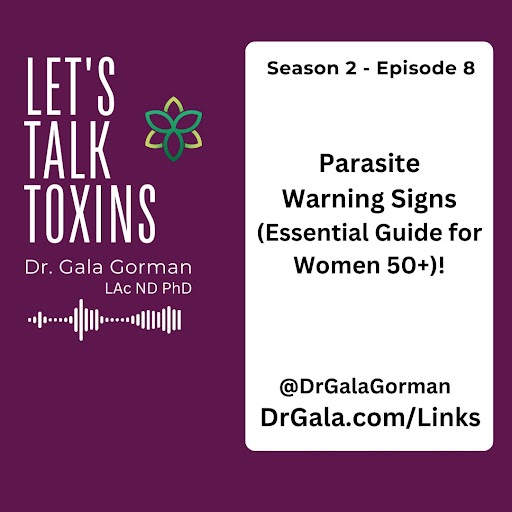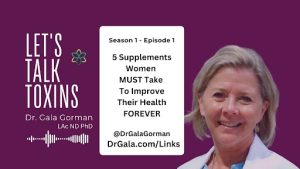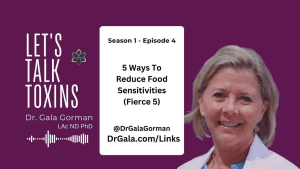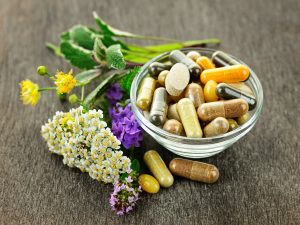NOTE: A machine generated this transcript. Please be aware that it may contain occasional errors in punctuation and spelling.
There are some specific types of therapies that are being studied. These are considered the good parasites, helmith therapy. Helminths are a type of parasite, and they’re being studied for the potential therapeutic benefits, including immune system modulation to treat autoimmune diseases.
Welcome to the Let’s Talk Toxin Show. In this episode, we’re focused on a type of toxin that affects many women but often goes unnoticed: parasitic infections. These critters are unwelcome guests in our bodies and can cause a range of symptoms, from digestive issues to chronic fatigue.
If you’re concerned about the impact of parasitic toxins on your health, you’re not alone. I’ll share insights so that you can recognize the symptoms of parasitic diseases and practical strategies for protecting yourself from these unwanted visitors. And make sure you stay to the end, where I answer questions from women just like you.
If you’re new here, I’m Dr. Gala Gorman, a licensed acupuncturist, naturopath, and author of “What’s Your Kryptonite?” I wrote the book to help women understand the effects of chronic stress that’s turned toxic. In the book, I share the MOLT Method™ I developed to make it easy to shed stress along with accumulated toxicity—just like any other creature in nature that’s outgrown its trappings.
Many women find their way to me after trying everything to deal with their annoying symptoms. You may feel like you’ve learned way more than you ever wanted to know about health and still aren’t healthy. It’s time for a different approach. Symptoms are directly related to stress, but stress isn’t easy to master, and it isn’t going away.
If you are ready for a new approach that will lead to stress mastery, I highly recommend my Wellness Warriors membership. It’s perfect for those who have a strong sense they’re missing something important—that’s the key to optimal wellness.
In the membership, we apply the MOLT Method™ I developed. MOLT is an acronym: M for mindset, O for order, L for lifestyle, and T for toxins. It’s designed to help you shed stress, cruise through midlife symptom-free, and end issues like chronic fatigue, insomnia, and even weight gain. Join us and turn your knowledge into real change. You can learn more at DrGala.com/Links.
In this segment, I share information from research studies related to toxicity. You can think of it as a Toxin Trend. As I mentioned a moment ago, the T in MOLT stands for toxins, and I can say with confidence that every symptom is caused by accumulated toxicity. I evaluate 12 categories of toxicity when I’m working with someone to unravel a health mystery.
Our world is full of manmade substances that our bodies were not designed to deal with. Couple this toxicity with an overwhelming amount of toxic stressors the body was designed to manage, and it’s no wonder women find themselves playing whack-a-mole with symptoms.
Here’s a report that’s a great example of a toxin trend. This is an article published in PubMed, and the research found that there are parasite-derived anti-inflammatory molecules. Essentially, some parasites surprisingly produce substances that can help reduce inflammation in the body.
Now, this is completely counterintuitive because most parasite infections cause inflammation in the body. So it might sound strange, but these substances could lead to new treatments for conditions like arthritis and other diseases that involve chronic inflammation.
Here’s a few key points that you might want to keep in mind: These anti-inflammatory molecules are known as ES-62 and are derived from roundworms. They work by calming down the body’s immune response. Just imagine your immune system as a fire that sometimes gets too hot—these molecules help turn down the heat essentially.
I assume that they’re kind of tricking your body into thinking that it’s okay. This might not be great as a long-term strategy, but if you have a condition that has really inflamed your internal systems, then this might be one of those outside-the-box approaches to use short-term to turn the situation around.
Some of these diseases are particularly worse with aging, and so it can really help to understand that some of these things actually can be used for benefit rather than only having harmful effects.
For mature women—especially those over 50—these molecules could relieve conditions like rheumatoid arthritis, which often worsens with age. When we reduce inflammation, these substances help improve joint health and reduce pain, these obviously making everyday activities easier for anybody with rheumatoid arthritis. I can imagine that anything that would improve the situation would be worth trying.
Researchers are excited about the potential of these parasite-derived molecules because they could lead to new medicines and these could be more targeted and have fewer side effects overall than current treatment options. So in the future, people might have access to safer, more effective treatments for these kinds of inflammatory diseases—and obviously improving quality of life is the most important thing to keep in mind.
Chapter 12 in my book, “What’s Your Kryptonite?” is dedicated to helping readers manage what I refer to as Tricky Toxins like these parasitic toxins we’re talking about in this episode. Our bodies are bombarded with toxicity, so we have to learn to manage it. Just comment “tricky toxins,” and we’ll send you a link where you can download the chapter for free.
If commenting isn’t convenient, go to DrGala.com/Links and sign up for my Wellness Weekly newsletter. You can respond to any email you receive from me with “tricky toxins,” and we’ll send you a link.
In this next segment, I’m opening the kimono to share how I was challenged to apply my suggestions—I’m Walking My Talk—and here’s an example: Every suggestion you’ll hear from me has been tested in the trenches. That includes saying no to symptom suppression.
Over the past four decades, I’ve developed processes that work sustainably. Typically, it requires a combination of approaches that I’ve synthesized to address health issues that show up repeatedly for many women.
In this case, I don’t have any personal crazy parasite stories, but I want to highlight a couple that have blown me away over the years. The story that probably affected me the most was reported by CBS News—and I’m sure other news outlets—but this is where I picked it up: Essentially, this young man went to the hospital with debilitating headaches that had come on kind of suddenly. The doctor thought he had a tumor and they moved forward relatively quickly to do surgery—and it turned out there was a parasite that had encased itself in larva in the brain of this man. And the surgeon removed it—and the larva and parasite were still alive—alive and growing in this man’s brain!
So if you don’t think parasites can live in our body and continue growing—and essentially how are they growing? They’re feeding off us! These parasites are really not to be taken lightly. If you suspect you’ve got some sort of parasite activity that needs addressed—do not kick the can down the road! I’ve also heard stories about people going through some sort of targeted parasite detox or cleanse—and expelling foot-long worms in the toilet!
Most parasites, honestly, you won’t see—they’re really small and are kind of hard to detect. But in some cases, these really long worms will finally succumb and die, and your body will be able to expel them. This is going to take some sort of targeted detox and usually really persistent efforts. These critters have not grown and proliferated in your body without meeting a whole lot of obstacles along the way, and so they’re not easy to eradicate.
Parasites, honestly, are not avoidable. If you’ve traveled at all, you are exposing yourself to new pathogens and new parasites that your body isn’t accustomed to dealing with regularly. You’re really not going to be able to avoid parasites; you just need to watch for signs that you have some sort of activity that’s escalating and do something about it before it gets out of hand.
Typically, parasites are not the first problem—they tend to be opportunistic. And so what happens is if your immune system is already compromised or you’re really stressed, then a parasite may be introduced, and your body isn’t able to kill it off in its early stages. Once it gets into your body, sort of sets up house, and figures out how to avoid your body’s defense mechanisms, that’s how these things tend to gain a life of their own essentially.
Some of the things we do to deal with a parasite overgrowth include is use what’s referred to as a full moon cleanse. We’ll talk about this as we get further into this episode, but parasites, in particular, seem to be more active around the full moon. When they’re out and active, they’re more vulnerable. So we want to make sure that if we are going to do a targeted cleanse for parasites, in particular, we do that around the full moon. We typically start a few days before and go through a few days after the full moon.
Herbs tend to be particularly targeted to different types of critters, so you want to make sure you’ve identified the right herbs for the job so that your approach is completely up to the task. I will also say that having pets in your home definitely creates more exposure. Cats and dogs are known carriers of parasites that can cross from the pet to a human, and so you’re going to need to do more regular maintenance if you are living in a home with pets.
Now, let’s continue talking about this hidden health concern that affects so many women: parasite infections and how they’re silently impacting our health. Understanding the symptoms of parasitic diseases is crucial as they can often mimic other conditions, making diagnosis really challenging. Symptoms can range from digestive issues to chronic fatigue, and if left untreated, these infections can really lead to serious health complications.
As I mentioned a few moments ago, we really can’t completely avoid exposure to parasites. The good news is that we can take practical steps to reduce our risk and support our body’s natural defense mechanisms against parasitic toxins and really parasite overgrowth.
Let’s explore what recent research tells us about managing parasitic infections and maintaining optimal health, especially for women. Let’s start by talking about when parasites really become a problem. Again, I’ll reiterate—we cannot avoid parasites.
Parasites can be found in just about every environment. And aterborne parasites are often found in drinking water, especially in areas with poor sanitation or during outdoor activities like camping. I will say that even if your tap water has been reportedly tested and considered safe, parasites can still sneak through. That’s one of the reasons why I recommend consuming higher-quality water like reverse osmosis three-stage filtered water or distilled or spring water.
You can get a distiller at home—it tends to be a fairly big and costly device—but most people actually choose to just buy distilled or spring water from the store. That gets problematic over time if you’re concerned about the environment like I am and want to save all those plastic bottles. It’s best to just install a really high-quality reverse osmosis filter.
As a reminder here—as I mentioned earlier—pets can carry parasites like hookworms and roundworms, and these can easily be transmitted to humans through contact. Just to point this out again: there are some good parasites that have been found to have beneficial effects on human health like the ones we talked about previously.
Helminths are basically parasitic worms that help modulate the immune system and can potentially reduce inflammation and improve symptoms of autoimmune diseases—even things like multiple sclerosis and allergies.
This concept is part of the hygiene hypothesis, which suggests that a lack of exposure to beneficial parasites might contribute to increased rates of autoimmune conditions in developed societies that really are trying to keep this sort of exposure to a minimum.
One thing when you’re worried about avoiding any sort of pathogen is to remember that it’s best to keep our immune system tuned up. Our immune system stays tuned up when we introduce manageable amounts of these toxins to our immune system while we’re in a healthy state. And so we don’t want to just avoid all kinds of pathogens of any sort—parasites would be included in that approach.
Common parasites that cause significant health issues include trichomonas, toxoplasma, and hookworms—of course this would be different types of hookworms than the ones we’re talking about a few moments ago. These parasites can lead to conditions like anemia, gastrointestinal problems, and even neurological issues if their left untreated.
Infections often spread through contaminated food, water, or direct contact with infected individuals or animals. Parasitic toxins can have both harmful and beneficial effects on the human body—something I want you to remember as you move through this episode with me.
Some parasites modulate the host immune response in ways that might be leveraged for medical treatments. And the research into unconventional uses of parasites in medicine really highlights their potential to inhibit immunological responses—which could lead to new therapeutic approaches.
The toxic effects of parasites remain a significant health concern though—particularly for the less common infections that aren’t widely recognized. When they’re not recognized early, they tend to amplify and become harder and harder to address.
There are some specific types of therapies being studied—these are considered good parasites: helminth therapy. Helminths are a type of parasite being studied for their potential therapeutic benefits—including immune system modulation—to treat autoimmune diseases.
And then there’s other instances where parasites interact with the human host and create sort of a co-infection. And so this truly would be thought of as a hyperparasitism, where one parasite directly feeds on another. And so this kind of thing wouldn’t typically be documented in humans. We don’t do these kinds of studies on humans, but humans can experience this similar sort of effect—this co-infection where multiple parasites infect the same host simultaneously.
This occurs with many types of parasites, including hookworms and intestinal protozoa. And then we end up with these overlapping regions in the body that are affected and additional risk factors for infection.
Some of the symptoms of parasites include itching, especially anal itching, around the full moon. Some people notice that their symptoms worsen around the full moon. I often say that this is in part because the body is made up mostly of water, and you see how the tides are affected around the full moon.
We tend to have what’s known as a king tide around the full moon. So you know that all that water in your body is being affected by the full moon. But it’s also true that parasites are more active during this time due to changes in serotonin levels in the body. And serotonin apparently helps parasites move and reproduce. And this leads to increased activity, including symptoms like itching or restlessness, even insomnia.
And so you might think of serotonin as essentially the happy brain chemical in the second brain or your gut brain. Serotonin production starts in the gut. So if you think about that during this full moon, when serotonin is more active, if you don’t have parasite overgrowth, then you should actually feel better during this period of time.
But if you find that you’re having worse symptoms and you’re feeling worse around the full moon, then that can definitely be an indication that parasites are compromising your production of serotonin. Some additional symptoms of parasite infections include digestive issues, unexplained diarrhea, constipation, bloating—even gas are common symptoms.
Sometimes these are mistaken for IBS (irritable bowel syndrome) or other gastrointestinal issues. And if that happens, then they might not be treated appropriately. This is one of the ways that these parasites then are allowed to grow over time, and the situation ends up getting worse—you know, you’re being treated for IBS, and that’s not really the problem.
Parasites can also cause unexplained chronic fatigue and even weight loss. I believe that they also can be contributing factors to weight gain for the digestive issues we mentioned previously. So getting this parasite overgrowth under control can definitely help your body free up some resources to help it better manage your weight—whether it’s weight gain or weight loss that’s an issue. The weight loss tends to be because your body is nutrient deficient because essentially the parasites are robbing your body of the nutrients that you’re consuming.
Skin problems include skin rashes and itching—as we’ve talked about—and that wouldn’t necessarily be just anal itching—even eczema. And this occurs typically because our immune system is hyperactive, and we may have allergic reactions that happen more readily if parasites are a problem for you.
Some people experience anxiety, again insomnia—we mentioned this—the restlessness, and all of these can be linked to increased activity of parasites during the full moon.
Why do symptoms flare up? Well, they may also be flaring up because of the lifecycle of the parasites. So the parasites have a lifecycle as well—and most parasites—not these really mature worms—most parasites have a fairly short lifecycle. But they lay eggs and then those eggs are basically dormant until they hatch. And this can make it also really difficult to eradicate them because you’ve got to catch them when they’re hatching.
And so one of the ways we do that is to treat during this full moon period, as I mentioned before. But when parasites are more active, they may be experiencing more die-off or even these new parasites are being hatched—and this can increase the toxin level essentially that they’re producing in your body. And that will obviously create additional symptoms and increase severity of symptoms.
An article published just a couple of months ago in January 2025 referenced a study released in December, and it revealed that hookworm parasites—the ones that are found in both pets and humans—are becoming increasingly resistant to the common treatments that are used by regular medical doctors.
This is a significant concern because hookworm infections can cause serious health issues in animals and people. The resistance has been identified in North America—here in the United States—and Australia, highlighting the need for new strategies to manage these parasites. Or I might suggest turning to old tried-and-true strategies that have been used since ancient times.
One of the types of larva that they looked at in this study is known as cutaneous larva migrans or CLM. This is hookworm larva, and it often causes a snake-like rash with itching and blisters known as CLM. So be careful if you think that you are having hives because it could be this CLM that’s related to parasites.
It typically resolves on its own but can be treated with anti-parasitic drugs. Again, I want to caution you that these anti-parasitic drugs can actually drive the parasites further into the body and make the problem worse. So you want to be very careful with any sort of medical intervention and prescription medication.
Hookworms are transmitted through skin contact with contaminated soil or feces—particularly—so prevention involves good hygiene practices like making sure you’re really careful with pet waste—you know, think like the kitty litter box, for example—you want to make sure you’re wearing gloves when you’re doing anything like that or even while you’re gardening.
Untreated hookworm infections can lead to severe health issues like anemia essentially from malnutrition—and this poses significant risk to vulnerable populations like children and pregnant women—but honestly it affects everyone if we end up with a nutrient deficiency—that is going to accumulate long term.
So let’s just recap this: What actually happens when parasites grow and digestive issues occur from nutrient deficiencies? So really, we’ve mentioned this previously—but we’ve got diarrhea, bloating, and gas. These nutrient deficiencies can cause fatigue and just general weakness.
Hookworms can cause a chronic loss of blood as well—and this leads to anemia and malnutrition. You know—for example—I donated blood this week when the blood drive truck was in the area—and one of the things they test for are your iron levels—and they’re looking for anemia. So I highly suggest donating blood if you have the opportunity to do that—it’s really helpful for a lot of health reasons—but it’s a quick way to just make sure that your blood is in good form.
Parasite infections cause increased inflammation in most cases—as we’ve talked about here—and these growing parasites can trigger an immune response in your body. The inflammation often causes joint pain and also skin rashes and itching like we’ve mentioned earlier.
But in severe cases, it might lead to more serious conditions and even organ damage. So what do we look for if we suspect organ damage? Well, if left untreated, parasites can cause significant damage to the vital organs like the liver, bladder, and intestines. This typically results in chronic pain and other severe complications.
And again, as I mentioned, parasites can be really hard to diagnose. Now, hopefully, if you’ve got a situation where parasites have grown to the point where it’s creating really severe complications and a parasite test is run, they will be detected. But just know that if you really suspect this, you may need to test several times because these parasites, especially as they mature, get better and better at hiding out and concealing themselves. These have been found to lead to liver fibrosis and bladder damage.
So remember, you can get the Tricky Toxins chapter of my book “What’s Your Kryptonite?” for free. Just comment “tricky toxins,” and we’ll send you a link where you can download the chapter. If commenting isn’t convenient, go to DrGala.com/Links and sign up for my Wellness Weekly newsletter. You can respond to any email you receive from me with “tricky toxins,” and we’ll send you a link.
Now, let’s continue with a few practical ways women can address the risks of parasitic infections and manage the symptoms of these parasitic diseases. These infections can affect more than just our digestive system—they can actually impact our overall health and increase our risk of various complications.
But there is good news: even small changes in our daily routines can significantly reduce our exposure to parasitic toxins and support our body’s natural defense mechanisms. And don’t forget—when I’m done, drop a comment to share which parasite-fighting strategies you’re planning to try and why you think they’ll work best for your health journey.
So some of the places we tend to find parasites in the body include the brain. And I know this is not really supposed to happen because we’re supposed to have what’s known as a blood-brain barrier. But what happens is if we inhale parasites—or often this is found to happen when somebody has been swimming in infected waters—parasite infections affecting the brain are less common, but they can be really severe.
Neuroschistosomiasis is a rare form of adult worms, and they migrate to be near the central nervous system or the CNS, and this can even cause seizures or headaches. Remember the example that I gave you earlier where the man had gotten a worm in his brain, and that worm had encased itself in larva and literally was appearing on the scans like a tumor.
So this type of condition occurs when the parasite’s eggs are transported to the brain—so think these are just microscopic—and this leads to inflammation and neurological symptoms if they are not killed before they begin to grow.
Digestion—we’ve mentioned this—is the primary way that we really experience parasite overgrowth. Parasites can affect the digestive system in several ways. These intestinal parasites like hookworms and roundworms cause digestive issues as we’ve mentioned before—like diarrhea, abdominal pain, weight loss—but these parasites often enter the body through contaminated food or water and lead to malnutrition, including anemia, as we’ve mentioned before if they are left untreated.
Common exposure sources, remember, include contaminated water primarily. So you want to really be careful where you’re swimming because water that gets into your nose, your sinuses—even through your ears—those are avenues that literally will pass the blood-brain barrier. So it’s really important to be careful when you’re camping, and you may be tempted to swim in infected or unclean waters or even drink untreated water.
Foodborne parasites are a little bit different—they’re known typically as toxoplasmosis—and these are typically consumed in undercooked meat or unwashed vegetables or vegetables that haven’t been washed good enough. They’re also found with contaminated cat feces.
And I suspect that one of the reasons why parasite overgrowth has become so common these days is because so many people live with pets as cats and have to deal with these unsanitary litter boxes in some part of their home that they come into contact with regularly.
If you’ve ever seen a cat use a litter box, you know that debris is flying into the air when they’re trying to cover up their deed—and that’s becoming airborne—and that airborne toxicity is being inhaled and potentially going into your brain.
Some of the sexually transmitted parasites include trichomoniasis—and this is commonly transmitted through the urogenital system—and so it’s possible that parasites can be considered a sexually transmitted disease.
Let’s talk now about some of the natural remedies we use to treat parasites. There are conventional medical treatments for parasites if the infection can be confirmed with a lab test. As I mentioned, parasites are great at hiding out in the human body, and a lab test won’t always produce reliable results.
Natural treatments are less risky and produce arguably better long-term results. So, one of the best things you can use on a regular basis to keep parasite activity low is garlic or oregano oil. Garlic contains allicin, and this has antimicrobial and antiparasitic properties. Oregano oil contains carvacrol and thymol, known for their antimicrobial effects—both of these can support the body’s natural defenses against parasites.
Some of the most common herbs that we use for treating parasites are wormwood and cloves. Wormwood has a compound known as thujone, and cloves have eugenol—and these have been traditionally used for their antiparasitic properties. They can help inhibit the growth and reproduction of parasites.
Another thing too you might use are seeds—papaya or pumpkin seeds. Papaya seeds contain papain, which has antiparasitic effect,s while pumpkin seeds contain cucurbitacin, which can paralyze and eliminate intestinal worms—both are used in natural deworming regimens, including those that I use.
Some additional holistic treatments and other herbs include black walnut—so this herb is traditionally used for its antiparasitic properties—but the efficacy varies—and in part it’s because if you’re not using it properly and attacking the problem when the parasites are most active it may not even address the issue at a time when the parasites are vulnerable.
But it’s also true that different herbs are better at targeting different types of parasites—so it’s important to know what you’re dealing with—and then creating a targeted protocol that addresses the specific problem.
You can also support your gut health with probiotics or digestive enzymes. And this can be really helpful to make sure that your gut is moving things through your system timely and that you’re absorbing the nutrients you’re consuming.
It’s important to make some dietary adjustments. You can increase the garlic and oregano oil—we talked about this a moment ago—and also use some of these seeds on salads and that sort of thing.
I typically create a targeted and comprehensive protocol to address the type of energetic disturbance that is identified with my bioenergetic scanning system. But you can use herbs that are known to help with parasite issues. It’s just important to address the specific type of critter that you suspect has taken up residence in your body.
Now, the answers I give to questions I receive quite often apply to and would be helpful for most women. I’ve accumulated a few related questions, and I’ll answer them in this segment. I refer to it as “Ask Away,” and if you’d like to ask a question, I created a form so that it’s sure to get answered, and your question could be shared in a future episode, helping many other women. So, comment “question” and we’ll get you a link to the form. If commenting isn’t convenient, go to DrGala.com/Links and sign up for my Wellness Weekly newsletter. You can respond to any email you receive from me with “question” and we’ll send you a link.
What are the most common symptoms of parasitic infections in women?
Well, digestive issues are definitely going to be the most common issues. These include unexplained constipation, diarrhea, gas, bloating, and nausea. But I will say that a lot of these symptoms occur for many different reasons, including just eating foods that don’t agree with you. So that’s one of the reasons why parasites often go untreated, and they’re allowed to grow.
It’s also common to have chronic fatigue, exhaustion, and even anemia if you’ve gotten a parasitic infection that has gotten out of hand. These parasites are feeding off of you and the nutrients you’re consuming, so your body is not getting what it needs to stay healthy—and what’s growing instead? The parasite, the worm, or whatever kind of parasite you’ve got going on.
There’s also the possibility of having unexplained rashes, including hives or eczema, or even just itching. So it’s really important that if you’ve got some kind of situation like this that’s really unexplained—or maybe you’ve gone to the doctor and they’ve just said it’s an allergic reaction—I urge you to keep poking at this and make sure that you’re not just taking some medication long-term that’s just allowing the problem to grow uninhibited.
So really watch the entire episode and make sure that you are being mindful of any symptoms that seem to be pointing cumulatively to the possibility of a parasite overgrowth.
How can I protect myself from getting parasites, especially when traveling?
Well, let me just remind you that it is impossible to protect yourself completely from getting parasites. I will say that when we’re traveling, we are exposed to parasites that our body’s not accustomed to dealing with. And so it is more common to come back from a trip—an overseas trip in particular—and have some sort of critter that has come along for the ride.
But some of the things you can do just to help minimize the damage include practicing good hygiene. You want to wash your hands frequently—especially before eating and after using the restroom. Be cautious with food and water—especially water coming that is coming out of the tap or with foods that tend to be raw and maybe haven’t been washed as well as they should be, like lettuce and that sort of thing.
You want to really drink bottled water, and if you can’t drink bottled water, then make sure you’re boiling the water. And avoid raw or undercooked meats or seafood—or even vegetables, as I mentioned. I love salads! And so you need to really make sure that if you’re going to eat a salad, make sure you’re consuming some garlic or carrying oregano oil with you and that may help get rid of whatever you’ve consumed before it has a chance to take hold.
You want to make sure you’re wearing shoes on beaches and avoid swimming in freshwater that may be contaminated. One thing I absolutely love doing is walking on the beach barefoot—in particular, it’s really great for grounding. So this is one thing where you need to be mindful of: if you have walked barefoot on a beach, you really wanna make sure you’re cleaning your feet well after exposure—potentially even with soap and water that would really minimize any potential of this sort of parasite making its way through your skin or even potentially capitalizing on some little abrasion that you have were you’ve got open wound even as small or superficial as it might be.
There is definitely something known as flesh-eating bacteria—and where this tends to be found is in beach areas or some kind of freshwater that’s been contaminated—so it’s really important to make sure specially if you’re in an area you’re not familiar with or that your body has not been exposed to previously to make sure you’re washing really good after your exposure.
What foods should I avoid to prevent parasitic infections?
Well, it goes without saying that raw or undercooked meats definitely have more likelihood of having parasites—even if they have been refrigerated. If the parasite was in the meat before it was refrigerated or even frozen, it’s really likely that parasite will come back to life when brought back to room temperature.
Imagine if a parasite can live in your body or brain—if it can go through stomach acid—if it can live in your brain and make it past your body’s immune system—do you really think that refrigerating or even freezing it is going to get the job done? Really, the only thing that will certainly take care of it is boiling or cooking—and cooking through whatever meat or food that you’re consuming.
So, when you’ve got something like vegetables or fruits eaten raw, it’s really important to wash these things well with something that would helpful to kill any of this sort of activity—and then obviously you’ll have to dry it.
Lettuce is particularly problematic, and I love salads, so it’s definitely an ongoing source of potential problems for me and for a lot of women—we love our salads, right?
There’s also the possibility of being exposed to parasites with unpasteurized dairy products and juices. I think this is less of an issue, especially in the United States, but I will say that I encourage you to avoid dairy products as much as possible because they tend to be really hard on your digestive system anyway.
Juices tend to have too much sugar, even natural sugar, so it’s best to minimize your exposure to dairy and juices. And I believe that’ll go a long way in minimizing the possibility of exposure to unwanted parasites.
Are there any natural remedies that can help treat parasitic infections?
Well, I encourage you to watch the whole episode because I went over quite a few things, but we’ll give you some ideas here. So, garlic is one of the best things to deal with parasites—honestly, any sort of infection. It’s known to have antimicrobial effects. It contains allicin, which has shown to be really helpful with parasites.
Pumpkin seeds are another thing that can be really helpful. These are believed to have certain properties that paralyze parasites. And when they’re paralyzed, they’re more vulnerable to whatever targeted detox we hit them with or even your own native immune system being able to handle them.
Papaya seeds can be mixed with honey, and this can be effective because the honey will entice them out—the sugar can entice them to come out of hiding—and then the seeds can potentially paralyze them, as we talked about with the pumpkin seeds. The other thing too that the honey can do is potentially catch them up in the honey and be able to be flushed out of the body in that way.
Can parasitic infections increase my risk of other diseases like autoimmune disorders?
Well, I would say that parasitic overgrowth is a definite trigger. This can trigger immunological disturbances and contribute to autoimmune diseases for sure. They also tend to do something that’s referred to as molecular mimicry—they’ve got structural similarities with proteins that your body is accustomed to dealing with.
Essentially, they trick your body into allowing them to hang out, and this eventually leads to autoimmune reactions once they get to the point where your body begins to sort of catch on and starts to detect them. If you’ve got chronic inflammation from long-term parasite infections, this can really lead to disease conditions or diseases that are thought of as autoimmune conditions.
Remember, if you’d like me to answer your question, make sure to comment “question” and we’ll send you a link to the submission form. You’ll want to subscribe to the channel to get notifications for regular updates.
And that’s a wrap for this episode! This has been the Let’s Talk Toxins Show. Make sure you subscribe to my channel on YouTube and activate notifications—you’ll get a reminder when I’m going live next. Until then, be well!













